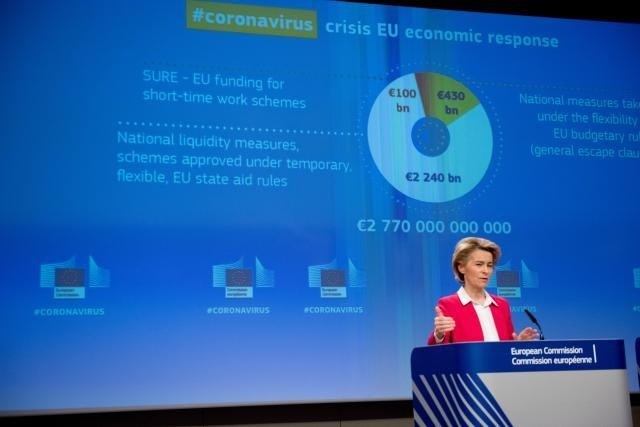The European Commission presented today a new initiative to provide loans to member states to fund short-term work schemes during the coronavirus crisis.
It can start as soon as the European Parliament and Council have approved it but requires that all member states provide guarantees.
The initiative was announced yesterday by European Commission President Ursula von der Leyen but only today (2 April) were the details disclosed.
“With a new solidarity instrument, we will mobilise €100 billion to keep people in jobs and businesses running. With this, we are joining forces with Member States to save lives and protect livelihoods. This is European solidarity,” she said at today’s on-line press briefing in Brussels.
The new instrument, called Support to mitigate Unemployment Risks in an Emergency (SURE), is designed to help protect jobs and workers affected by the pandemic. It will provide financial assistance, in the form of loans granted on favourable terms from the EU to member states, of up to €100 billion in total.
Short-time work schemes exist already in most member states. They are programmes that under certain circumstances allow firms experiencing economic difficulties to temporarily reduce the hours worked by their employees, which are provided with public income support for the hours not worked. Similar schemes apply for income replacement for the self-employed.
Financial assistance under the SURE instrument is open to all member states and will take the form of a loan from the EU to the member states that request support.
To finance the loans to member states, the Commission will borrow on financial markets, so-called sovereign lending with low risk. The Commission would then provide the loans to member states on favourable conditions. Member states would, therefore, benefit from the EU's strong credit rating and low borrowing costs.
But there is a catch. Loans provided under the SURE instrument will have to be underpinned by a system of voluntary guarantees from member states. To this end, a minimum amount of committed guarantees, 25% of the maximum amount of loans of €100 billion, is needed according to the Commission.
In fact, all member states have to participate with guarantees for SURE to become effective. Von der Leyen did not doubt that SURE will be supported by all of them, including those that are considered more “frugal”.
In a following technical briefing, two senior Commission officials explained SURE in some more detail. There are a great variety of short-term employment schemes in the member states and they are constantly adapted. 18 member states have already short-term employment schemes in place since the previous economic crisis and other countries have introduced similar schemes.
As always, any new initiative must have a legal basis in the EU treaty and so is the also the case now. The SURE scheme has been designed so that member states can weather the economic chock of the coronavirus crisis and enable the existing schemes continue operating during the crisis. It does strictly speaking not apply to self-employed people but they can also be supported under SURE.
The lockdown of the economy has forced many companies not only to reduce working time but to lay off their staff or to send them on unpaid leave. National unemployment schemes often require that employees have worked for some period to quality for support. The Brussels Times asked if SURE will address this problem.
“No, it’s not a European scheme and the Commission doesn’t set the rules in the member states. What SURE does is to provide loans to the national short-term employment schemes so that people are not fired and will stay employed. But teleworking at home is fine with us.”
In her presentation, von der Leyen described the initiative in medical terms, as giving breathing space and injecting oxygen to the economies of the member states. Together with other support schemes and the loosing-up of rules on state aid and use of structural funds, the total economic support amounts to a “Marshall plan”.
M. Apelblat
The Brussels Times

